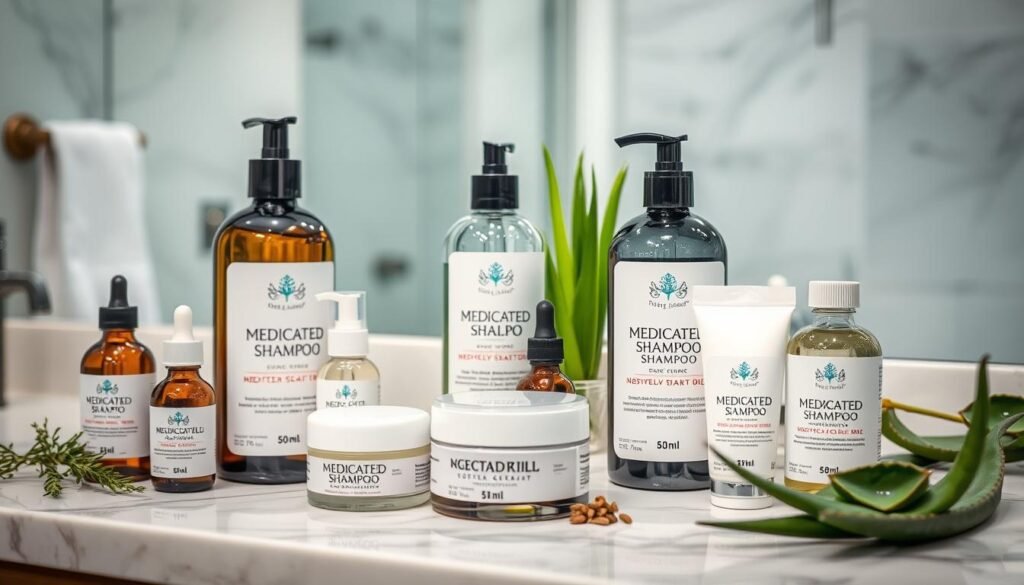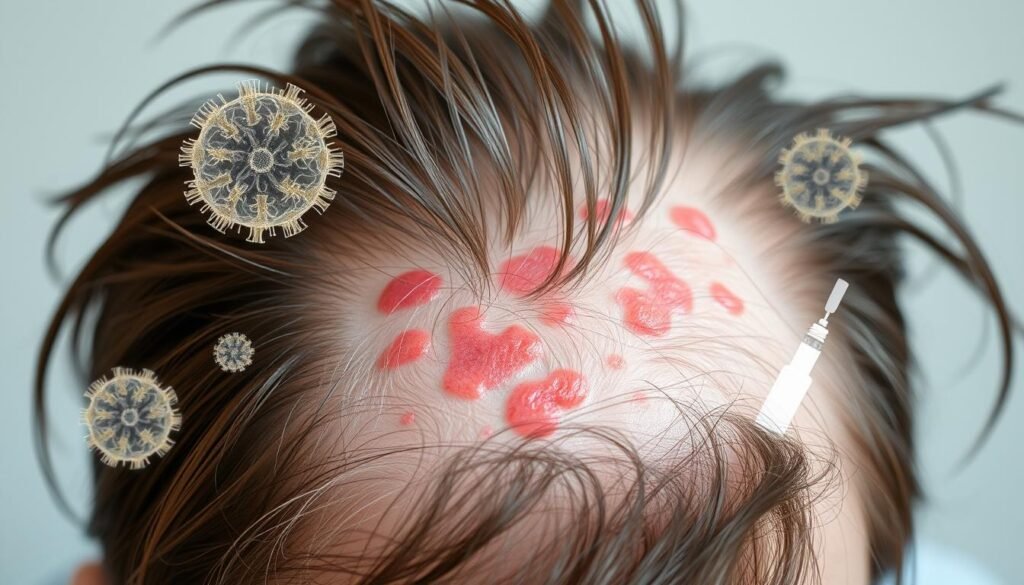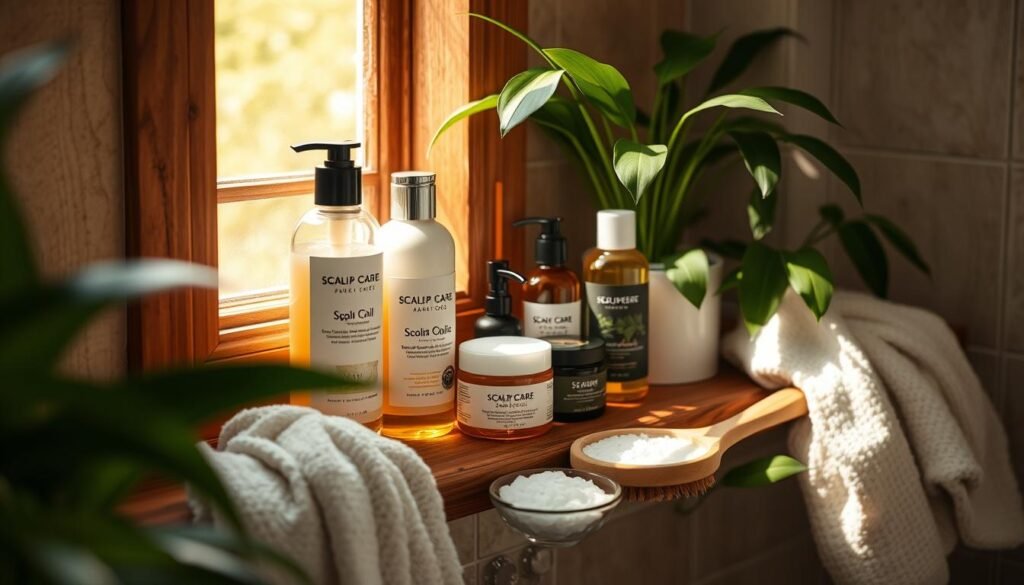Did you know more than half of people will have an itchy scalp at some time? This problem usually tells us about deeper scalp conditions or habits that need our attention. Issues like dry scalp, dandruff, eczema, or psoriasis highlight the importance of effective treatments for healthy scalp care.
Readers will learn about a range of expert solutions in this article. These include simple home remedies like apple cider vinegar and coconut oil. You’ll also find information on shampoos with key ingredients like zinc pyrithione and salicylic acid. Knowing the cause of the itch is key, especially if symptoms keep up. In such cases, a healthcare professional’s help may be needed.
Keeping up with scalp care can save you from discomfort and keep your hair healthy. For those who prefer natural methods, options like peppermint oil are worth trying. If symptoms don’t improve in a week or if other worrying signs show up, it’s crucial to see a doctor.
Key Takeaways
- Identifying the underlying cause of an itchy scalp is essential for effective treatment.
- Home remedies, such as apple cider vinegar and coconut oil, can alleviate symptoms.
- Medicated shampoos containing ingredients like zinc pyrithione and clobetasol propionate are available for more severe cases.
- Practicing good scalp hygiene helps prevent itchiness and promotes overall scalp health.
- If itching persists, seeking medical advice is crucial to rule out serious conditions.
Understanding the Causes of Itchy Scalp
An itchy scalp, or scalp pruritus, comes from many sources. Knowing the causes of itchy scalp helps treat it well. People often get it from dryness, dandruff, or allergies. Harsh hair products can also make your scalp itchy.
Often, seborrheic dermatitis is to blame. This is due to too much yeast on the scalp. It causes itching and flaking. Another common cause is psoriasis. Up to half the people with it feel significant discomfort. Lastly, ringworm infections need special treatment like oral antifungals.
Things around us can make it worse. For example, some hair products have allergens. These allergens can lead to contact dermatitis, which makes your scalp itchy. If your scalp itches a lot, see a doctor. A good diagnosis and care plan can prevent more serious problems.
Looking for more details? Check out here for a full guide.
Common Scalp Conditions Leading to Itchiness
Various scalp conditions can make you very uncomfortable, mainly due to itchiness. Dandruff is one common issue that leads to flaking skin. It usually comes from having dry skin or something more severe like seborrheic dermatitis. This makes your scalp red, itchy, and scaly, both uncomfortable and not nice to look at.
Scalp psoriasis is another condition that causes flaky and cracked skin. It happens when skin cells build up quickly, causing a lot of itching and irritation. People often scratch these areas, but this only makes things worse, causing more problems like hair loss.
Scalp eczema is yet another condition that causes a lot of itchiness. It’s all about inflammation and discomfort, and it can be triggered by many things. Things like allergens and environmental factors can set it off. It’s crucial to find out what causes your irritation so you can avoid it.
Addressing these conditions early is important to avoid worse problems like scalp infections or hair loss. Always talk to dermatologists or healthcare experts to get helpful advice and treatment. This helps keep your scalp healthy.
Home Remedies for Itchy Scalp
Natural treatments are great for soothing itchy scalp issues. Ingredients found at home can offer relief without harsh chemicals being necessary. Here are some remedies that might help with scalp itchiness.
Apple Cider Vinegar as a Natural Treatment
Apple cider vinegar can fight scalp itchiness thanks to its antimicrobial qualities. By mixing it with water, you can make a solution. This mix should be used a few times weekly and rinsed off well.
Benefits of Organic Coconut Oil
Organic coconut oil is full of lauric acid, which makes it absorb well into the skin. It also fights fungal issues, helping with itchy scalps. Using it regularly can moisturize and soothe the scalp.
Using Peppermint Oil for Relief
Peppermint oil is known to calm scalp itchiness. When diluted and applied, it provides substantial relief. Combine it with a carrier oil for a gentle massage, improving scalp health and relieving itchiness.
Importance of Scalp Hygiene
Keeping a clean scalp hygiene is key to avoiding an itchy head. Washing your hair regularly removes product buildup, oils, and dead skin. It’s important to find the right washing frequency for your hair type. For instance, people with fine hair might need to wash it more often. But those with textured hair could benefit from less frequent washing.
Studies show that not keeping your scalp clean can lead to problems. Dry scalp, which can hit up to half of us, can cause dandruff and irritation. This may indicate an imbalance caused by too much oil, bacteria, or reactions to hair products. Learning about good hair care is crucial for scalp health.
When you take care of your scalp, it stays clean, hydrated, and well-circulated. Neglect can lead to issues like seborrheic dermatitis, affecting 3% to 5% of people. Use gentle shampoos and conditioners suited to your hair type. This helps avoid irritation and keeps your scalp in top shape.
Over-the-Counter Treatments for Itchy Scalp
Dealing with an itchy scalp involves various OTC treatments. These include products that target conditions like dandruff and psoriasis. Knowing about these treatments helps you choose the best one.
Zinc Pyrithione Shampoos
Zinc pyrithione shampoos are popular for fighting dandruff. They have antifungal traits that tackle seborrheic dermatitis and itching. Using these shampoos regularly can make a big difference.
Salicylic Acid Shampoos
Salicylic acid shampoos are key for exfoliating the scalp. This makes it easier for treatments to work better. They are especially good for those with scalp psoriasis. Always follow the usage instructions to get the best results.
Ketoconazole and Its Benefits
Ketoconazole shampoos are excellent for dandruff. They fight off fungal infections and soothe inflammation. Regular usage can improve scalp health in a few weeks.
Check out this resource for detailed info on treating dandruff, including the benefits of antifungal shampoos. It will help you find suitable products for your situation.
Medicated Options: When to See a Doctor
When you have severe itching, watch your symptoms closely. Go to the doctor if it lasts more than a week or gets worse. This itching could be a clue to other health issues. It could be due to dry skin, allergies, psoriasis, or eczema.
Some may need prescription treatments for tough scalp problems. Doctors might suggest antifungal or corticosteroid products. These can fight fungus or reduce swelling. For less harsh treatment, calcineurin inhibitors could be an option.
If store-bought remedies don’t work, you might need tests. Tests like skin biopsies or blood work can find the cause. Knowing exactly what’s wrong helps find the best treatment. Here’s a table of some common treatments:
| Treatment Type | Form | Usage |
|---|---|---|
| Over-the-Counter Shampoo | Shampoo | For mild to moderate itching. |
| Prescription Strength Shampoo | Shampoo | For moderate to severe itching. |
| Topical Corticosteroids | Gel/Cream | For reducing inflammation in severe cases. |
| Antifungal Treatment | Gel/Cream/Shampoo | For fungal infections and persistent symptoms. |

Managing Stress to Alleviate Itchy Scalp
Stress and anxiety are often behind itchy scalp issues. High stress can mean more scalp itchiness. This comes from anxiety making skin reactions worse. Meditation is a key way to help with these symptoms.
Effects of Meditation on Scalp Health
Meditation helps us feel better overall. It lowers anxiety and helps us relax. Doing it regularly can make your scalp healthier.
When you manage stress with meditation, your skin gets less sensitive. This means your scalp won’t react badly to stuff like shampoo or air pollution.
- Meditation makes you less anxious, which helps your scalp.
- Mindfulness makes you aware of itching, so you don’t scratch as much.
- Studies show meditation calms your mind, which is good for your skin.
For a healthy scalp, we need to look at the whole picture. This means both what we put on our heads and how we feel inside.
Meditation is a big part of managing stress. It helps a lot with itchy scalp issues.
| Strategy | Benefits | Impact on Scalp Health |
|---|---|---|
| Meditation | Reduces anxiety | Less skin sensitivity |
| Deep Breathing | Promotes relaxation | Decreases itching |
| Guided Imagery | Enhances mood | Prevents flare-ups |
| Physical Exercise | Releases endorphins | Improves blood circulation |
Meditation and similar methods are key in stress management. They help your mind and your scalp health. This approach looks at both your mental health and scalp care.
How Allergic Reactions Contribute to Itchy Scalp
Allergic reactions are a big cause of itchy scalp, leading to contact dermatitis. This happens when your scalp doesn’t agree with certain ingredients. Things like shampoos, conditioners, and dyes can be the culprits. Especially, para-phenylenediamine in hair dyes is a known irritant.
Those with scalp irritation may see redness, hives, or rashes. This itchiness can be really bothersome. Plus, it might come with dry patches or flakes. Failure to remove the problem product can make things worse. This could even lead to hair loss. Choosing hypoallergenic hair care items helps lower such dangers.
Symptoms of an allergic reaction can show up quickly after contact. It’s important to watch how you react and get medical help if it doesn’t get better. Dermatologists usually say to stop using any product you suspect. This is to see if your scalp health improves.
To avoid these symptoms, prevention is crucial. Use simple hair care routines and steer clear of fragrances or dyes. Making sure to clean your scalp well can also help remove allergens. This keeps contact dermatitis at bay.

Identifying Fungal Infections and Lice
Spotting fungal infections and head lice quickly is key for the right treatment. Fungal issues like ringworm cause scalp discomfort, and lice lead to lots of itching. Knowing the signs helps start treatment sooner.
Signs of Fungal Infections
Fungal infections show up in different ways on the scalp. Look for round, red, scaly patches as a clear sign. These patches may make hair fall out. Recognize symptoms like itching and flaking too. These suggest you might have tinea capitis. For persistent symptoms, it’s wise to see a doctor for antifungal help.
Dealing with Head Lice Effectively
Head lice are a big nuisance, especially for kids. Each year, 6 to 12 million kids get lice, a common school issue. The main clue is a lot of itching, often worse at night. Parents should look for lice or tiny eggs in the hair. For mild cases, you can try treatments from the store. But if it keeps up, see a doctor for something stronger.
Below is how fungal infections and head lice compare:
| Condition | Causes | Common Symptoms | Treatment |
|---|---|---|---|
| Fungal Infections | Fungi (e.g., ringworm) | Circular patches, redness, flaking | Antifungal treatments (tables and topical) |
| Head Lice | Parasitic insects | Intense itching, visible nits | Over-the-counter or prescription treatments |
Maintaining a Healthy Scalp Routine
Having a steady scalp routine is key to good hair health. It lets people tackle common scalp problems and encourages the best setting for hair to grow. Knowing the right time and method to clean the scalp impacts its health greatly.
Frequency of Shampooing
The need to shampoo varies with different hair types. Those with oily hair might need to wash it every day. On the other hand, people with curly or textured hair might only wash once a week. Customizing shampoo frequency prevents buildup, irritation, and too much oil.
Cleaning your hair regularly keeps the scalp healthy. It helps reduce inflammation and promotes hair retention.
Choosing the Right Hair Products
Choosing the right hair care products is crucial for scalp care. It’s important to use gentle, sulfate-free shampoos and conditioners suited to your scalp. These selections help avoid irritation and keep the scalp’s moisture.
Adding items like pre-shampoo treatments and exfoliating shampoos can improve your routine. For detailed scalp care tips, visit here. A customized scalp routine and the proper hair care products can greatly improve your scalp’s health. This can solve problems like dryness and itchiness.

Preventative Measures for Itchy Scalp
Taking early steps is key to having a healthy scalp. Know and manage what causes your itchiness. Figure out what irritates your scalp, like certain hair products or the environment, to help prevent it.
Recognizing Triggers and Avoidance
Finding out what causes scalp discomfort is crucial. Sometimes, things like shampoos or stylers have harsh ingredients. Keeping track of what makes your scalp react can lead to finding safer products.
Things like cold weather can make dandruff worse, a problem for many. By watching these outside factors, you can keep your scalp happy. Trying home solutions and changing your diet to include things like omega-3s helps against dryness.
Using treatments like organic coconut oil can calm your skin. For more tips on a healthy scalp, check out this guide on lifestyle changes.
| Common Triggers | Prevention Strategies |
|---|---|
| Harsh Hair Products | Use gentle, hypoallergenic formulas |
| Environmental Factors (Cold/Dry Weather) | Maintain indoor humidity levels |
| Stress | Practice stress-management techniques such as yoga |
| Nutritional Deficiencies | Incorporate omega-3 fatty acids in your diet |
| Infrequent Washing | Regularly cleanse hair to remove buildup |
Conclusion
An itchy scalp has many causes, from dryness to skin issues like eczema. Knowing why it happens is key to treating it right. To help, we look at many solutions. These range from home cures and store-bought products to doctor-recommended treatments. This mix helps ease the itch and supports healthy hair.
Ignoring an itchy scalp can lead to worse troubles, such as losing hair. If you notice constant itching, pain, sores, or your hair getting thin, see a doctor quickly. They will offer the right advice for your situation. This includes how to prevent problems and how to treat them. Getting help early is crucial for keeping your scalp healthy and encouraging hair growth.
To make your scalp healthier, keep it clean, use gentle hair products, and handle stress well. Understanding the link between an itchy scalp and losing hair shows why fast action is important. Being active in taking care of your scalp leads to better results. It keeps you comfortable and makes sure your hair can grow strong and healthy.